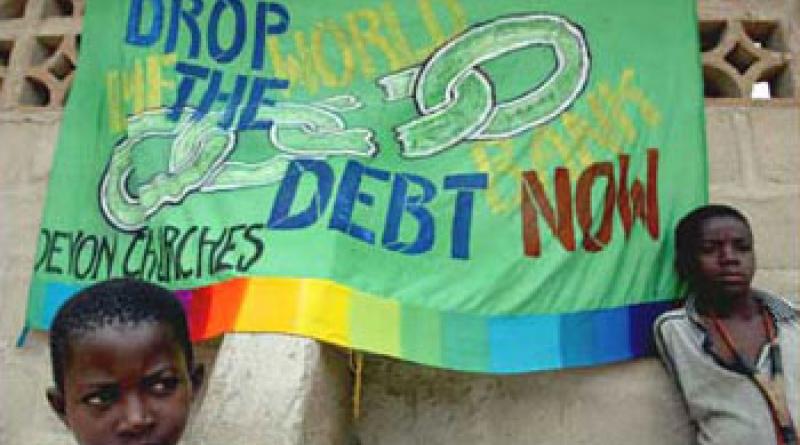Stop Africa's debt crisis from spiraling out of control

Time for the World Bank and IMF to act
Power Shift Africa and Earth4All are jointly coordinating this open letter, signed by African thought leaders together with international economists, scientists, and sustainability experts.
Together, we call on political leaders at the 2024 Spring Meetings of the World Bank and International Monetary Fund (IMF) to take bold and urgent action to address the debt crisis of low-income countries, especially those in the African continent.
The debt crisis is hitting Africa harder than any other continent. More than half the continent’s low-income countries are in debt distress or on the brink of it. Over half of the African population live in countries that spend more on interest payments than on key social sectors such as health, housing, education and climate action. Socio-economic safety nets are being stretched to near breaking points with Africa’s debt crisis now unfolding into a humanitarian challenge embedded in a planetary crisis.
If the international community does not urgently solve Africa’s debt crisis, the continent will be consigned to a development crisis that will take decades from which to emerge. On top of this, Africa’s exorbitant debt servicing costs are stripping it of resources to address worsening climate extremes and this too will have global ramifications. Ultimately, growing inequality and social tension on one continent will impact all continents.
By failing to tackle these problems systemically, African countries risk falling deeper into a cycle of worsening inequality, racial divides, rising social tensions and unrest, right-wing populism and democracy backsliding.
But we do know that transformative policies, especially reform of the international financial system, could facilitate the end of poverty within a generation in Africa. If we support ambitious debt relief, Africa could become one of the major sources of economic development for the world. Sustainable growth will not only lift millions of Africans out of poverty, but it could accelerate a global rebound that is green, just and inclusive.
However, in order to move forward, we must first recognise that Africa’s catastrophic debt levels are a systemic failure in the global financial architecture. In the words of the UN Secretary-General the system is “outdated, dysfunctional, and unjust”. This is why we urgently need a deeper paradigm shift in the current financial architecture, one that is grounded in a human rights-based response that can cope with the triple threat of conflict, climate change and economic shocks. Without systemic solutions, it will be impossible for the African continent to harness the resources needed to forge its own development path, to fight climate change, and meet the Sustainable Development Goals.
But the World Bank and IMF’s reform track records have thus far been woefully inadequate. Despite their efforts during the pandemic to address debt distress, in recent years high income countries have refused to transform the system that gives them all the decision-making power on sovereign debt resolution. Instead, public spending and tax cuts continue to be enforced as opposed to more systemic solutions to improve the global debt architecture.
Nowhere was this more evident than last year’s Annual Meetings of the World Bank and the IMF in Marrakech, which failed to deliver on urgent calls for immediate debt cancellation and reform of the international debt architecture. The G20 member states’ resistance is increasingly matched by the defiance of China and private lenders, accelerating our fast-tracking into a fractured world in crisis.
We therefore call on all bilateral, multilateral and private lenders to:
- Immediately cancel public external debt payments for all African countries.
- Transform biased credit rating practices of the big three credit rating agencies (S&P, Moody’s, Fitch).
- Commit to urgent reform of the G20 Common Framework.
- Urge private lenders to participate in debt reduction and rescheduling of loan repayments from low-income African countries to tackle the debt crisis.
- Honour commitments to reallocate Special Drawing Rights (SDRs) to vulnerable countries.
- Restore broken climate finance promises to support African countries’ climate goals estimated at approximately $2.8 trillion.
- Commit to a credible reform path for the global debt architecture.
- Pay climate finance debts owed by G20 countries in the form of unconditional grants and technology transfer. Since low-income countries, especially in Africa, are owed at least $2.4 trillion in climate finance by 2030, they should withhold the equivalent of that debt until promises are fulfilled.
- Channel climate and development finance to strategic investments in regenerative agriculture and agroecology to restore Africa’s food sovereignty, renewable energy deployment for Africa’s development rather than for export.
- Stop promoting austerity conditions and promote bold, structural and transformative solutions at-scale, not small, superficial solutions.
The Spring Meetings must be a rallying cry for urgent action to address the root causes of the debt crisis and to commit to meaningful reform of the global financial system and debt architecture. We urge high income countries to stop blocking serious reform efforts as they did at the 2023 Annual meetings.
The escalating debt crisis in African countries is not merely an economic issue. It is rapidly becoming a humanitarian challenge of global proportions, which demands an immediate, concerted, and systemic response. We therefore call upon political leaders to commit to reforming an outdated financial system and by doing so, to signal their collective commitment to security, human dignity and global justice.
Signed:
Mohamed Adow, Founder and Director of Power Shift Africa
Faten Aggad, Adjunct Professor at the Nelson Mandela School for Public Governance
Teresa Anderson, Global Lead on Climate Justice, ActionAid International
Andrés Arauz, Politician and Economist, Ecuador
Nnimmo Bassey, Director, Health of Mother Earth Foundation
Tzeporah Berman, Chair, Fossil Fuel Non-Proliferation Treaty
C. P. Chandrasekhar, Director of Research and Policy, International Development Economics Associates (IDEAs)
Andrés Chiriboga, General Coordinator, Sovereign Debtors’ Clubs Project, Associate professor, Sciences Po Paris
Heidi Chow, Executive Director, Debt Justice UK
Rob Davies, Honorary Professor, University of Cape Town and former Minister of Trade and Industry of South Africa (2009 to 2019)
Sandrine Dixson-Declève, Co-President of The Club of Rome and Executive Chair of Earth4All
Maria Fernanda Espinosa, Former President of the UN General Assembly
Tasneem Essop, Executive Director, Climate Action Network-International
Jelel Ezzine, Ecole Nationale d’Ingénieurs de Tunis (ENIT),University of Tunis El-Manar (UTM) and Fellow of the World Academy of Art and Science
Saliem Fakir, CEO, Africa Climate Foundation
Mathew Forstater, Professor of Economics and Research Director of the Global Institute for Sustainable Prosperity, University of Missouri
Maha Ben Gadha, Senior Economic Program Manager Rosa Luxemburg Stiftung, North Africa Office
James K. Galbraith, The University of Texas at Austin
Niclas Hällström, Director, WhatNext? Member, Independent Expert Group on Just Transition and Development
Hamza Hamouchene, North Africa Programme Coordinator, Transnational Institute (TNI).
Hans R. Herren, Board Chair, Millennium Institute and Biovision Foundation
Fatuma Hussein, AGN negotiator in the UNFCCC process
Mo Ibrahim, Founder and Chair of the Mo Ibrahim Foundation, and co-Founder and co-Chair of the Africa Europe Foundation.
Fadhel Kaboub, Senior Advisor, Power Shift Africa and Member of the Earth4All Transformational Economics Commission
Stephanie Kelton, Professor of Economics and Public Policy, Stony Brook University, and author of The Deficit Myth
David Korten, president of the Living Economies Forum; member of the Club of Rome, member of the Earth4All Transformational Economics Commission
Alex Lenferna, General Secretary, South African Climate Justice Coalition
David McNair, Executive Director, Global Policy, ONE Campaign
Vandi C. Minah Esq. Former Permanent Representative of Sierra Leone to the United Nations (2013 – 2016)
Chenai Mukumba, Executive Director, Tax Justice Network Africa
Yacob Mulugetta, Professor of Energy and Development Policy at the University College London.
Chantal Naidoo, Founder, Rabia Transitions
Fati N’zi-Hassane, Director of Oxfam in Africa
Chukwumerije Okereke, Chair in Global Governance and Public Policy, University of Bristol, UK
Dimitri Papadimitriou, Professor of Economics Bard College, President, Levy Economics Institute
Ann Pettifor, Director, Prime Economics Institute
Alex Rafalowicz, Executive Director, Fossil Fuel Non-Proliferation Treaty Initiative
Asad Rehman, Executive Director, War on Want
Maria João Rodrigues, President, Foundation for European Progressive Studies
Ndongo Samba Sylla, Head of Research and Policy for Africa region, International Development Economics Associates
Paul Shrivastava, Professor, Pennsylvania State University, Co-President, The Club of Rome
Anne Snick, Club of Rome, associate member, Ethics Expert in Research and Innovation for the European Commission
Youba Sokona, former Vice-Chair IPCC and Honorary Professor, University College London
Mathew Stilwell, Senior Attorney, Institute for Governance and Sustainable Development and co-author Just Transition: A Climate, Energy and Development Vision for Africa
Per Espen Stoknes, Associate professor and co-director of the BI Center for Sustainability and Energy, Norwegian Business School and Member of the Club of Rome and co-chair Earth4All
Pavlina R. Tcherneva, Professor of Economics, Bard College, and Director, OSUN Economic Democracy Initiative
Antonio Valero, Emeritus Professor of Energy Systems, University of Zaragoza, Plenary Member of the Club of Rome
Stewart Wallis, Chair, The Wellbeing Alliance
Amos Wemanya, Senior Climate & Energy Advisor, Power Shift Africa
Asad Zaman, Professor, Akhuwat University, Former Vice Chancellor, Pakistan Institute of Development Economics




